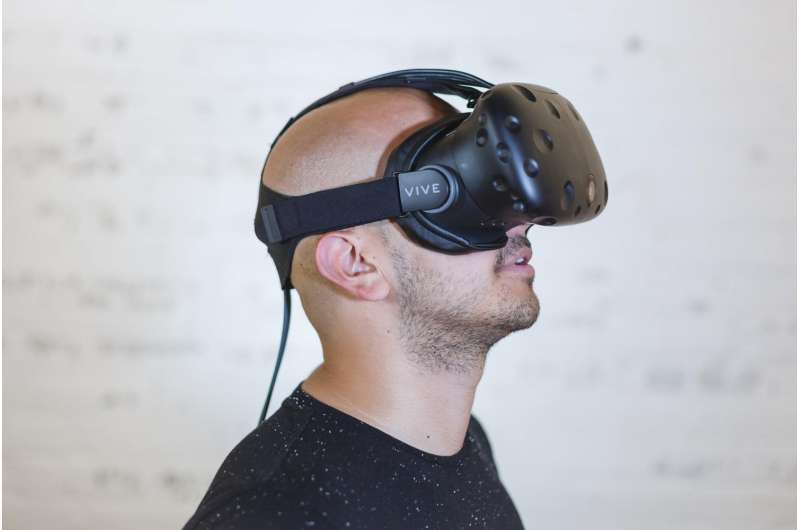This article has been reviewed according to Science X's editorial process and policies. Editors have highlighted the following attributes while ensuring the content's credibility:
fact-checked
peer-reviewed publication
trusted source
proofread
Immersive virtual reality seems to ease cancer patients' pain and distress

Immersive virtual reality—digital technology that allows a person to experience being physically present in a non-physical world—seems to ease the pain and distress felt by patients with cancer, suggests a pooled data analysis of the available evidence published in BMJ Supportive & Palliative Care.
The technology may also have potential for people with other distressing long term conditions, such as multiple sclerosis (MS), kidney disease, and dementia, the findings indicate.
As the physical and practical costs of virtual reality technologies have fallen, interest in their use for improving patients' quality of life has grown, note the researchers. But it's not clear how effective they might be in helping people cope with the medical treatment and psychological impact of a long term condition.
To explore this further, the researchers trawled research databases for studies that looked at the use and effectiveness of immersive virtual reality for aiding psychological adjustment to a long term condition in adults.
They found 31 relevant studies, published between 1993 and 2023, in which the technology had been used in patients with cancer (16), dementia (5), cardiovascular disease (4), multiple sclerosis (2), kidney disease (2), inflammatory bowel disease (1), and chronic obstructive pulmonary disease (1).
The studies ranged in size from 30 to 50 participants, with an average age of 51. Three out of four participants were women. On average, a virtual reality session lasted 20 minutes, ranging in delivery from one application to daily for a specified period.
The studies looked at environment-based and game-based immersive virtual reality interventions, designed either to relax the user ahead of medical treatment with a combination of a nature walk and mindfulness meditation, for example, or to engage them by equipping them with specific skills or behaviors to help them cope better with their condition.
Pooling the study results showed that patients were happy to use immersive virtual reality and that it helped those with cancer, dementia, cardiovascular disease, multiple sclerosis and kidney disease cope better with required medical treatments and the emotional impact of their condition.
The types of virtual reality and procedures used varied widely across the included studies, and no one particular type emerged as noticeably more effective than any of the others.
But 13 of the 31 included studies were feasibility or pilot studies, and a further four were considered to have a high risk of bias. Sample sizes were often small and not many studies included a comparison group, meaning that a degree of caution is required in interpreting these findings, emphasize the researchers.
Exactly how immersive virtual realities might exert their physical and psychological effects on patients still isn't clear, the researchers say, suggesting that the technology might be distracting and absorbing, or alter the user's state of mind, thus reducing the subjective experience of pain and/or boosting their ability to cope with the physical and psychological impacts of their condition.
"These findings are promising in a population at risk of polypharmacy, and suggest immersive VR [virtual reality] can offer a non-pharmacological intervention that is considered acceptable by clinicians, caregivers, and patients," they write. "As VR systems become progressively more accessible, immersive VR interventions may begin to offer cost benefits compared with conventional pharmacological and non-pharmacological treatments," they add.
Further research is needed to better understand how the technology works, if any particular type is more effective and under what circumstances, and what—if any—long-term effects there might be, they note.
But they conclude, "Our findings suggest that VR interventions are acceptable treatments that have the potential to improve physical and psychological consequences of physical illness. There is good quality research to suggest that these VR interventions are effective in reducing pain and distress, particularly among people with cancer."
More information: Immersive virtual reality and psychological well-being in adult chronic physical illness: systematic review, BMJ Supportive & Palliative Care (2023). DOI: 10.1136/spcare-2023-004502


















